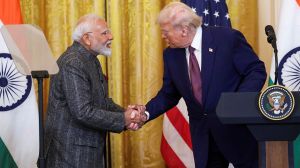How UAE’s golden visa scheme works
The golden visa system allows residents, foreign expatriates and their families to move to the UAE to work, live or study
 The proposed policy awards Indians the UAE’s golden visa for life on paying a fee of AED 100,000 (around Rs 23.3 lakhs), sources told PTI. This policy would do away with the current requirement of investing in property or a business in the Emirates. (Freepik)
The proposed policy awards Indians the UAE’s golden visa for life on paying a fee of AED 100,000 (around Rs 23.3 lakhs), sources told PTI. This policy would do away with the current requirement of investing in property or a business in the Emirates. (Freepik)The United Arab Emirates government on Tuesday (July 8) refuted claims about a new nomination-based golden visa programme which would provide lifetime residency specifically for residents of India and Bangladesh.
News agency PTI on Monday had reported that the proposed policy would award Indians a UAE golden visa for a fee of only AED 100,000 (around Rs 23.3 lakh). This policy would do away with the current requirement of investing in property or a business in the Emirates.
What are golden visas? How does the UAE system work?
What are golden visas?
Individuals seeking to immigrate to a country are typically required to fulfil criteria such as a minimum educational qualification and/or an offer letter from a company to work there. This process can be tedious and may take years.
A golden visa bypasses this requirement, and hedges on an individual’s ability to pay a significant sum of money to the host country, which may be in the form of investments in government bonds, real estate and more.
A smaller number of countries offer the ‘golden passport’, another route to citizenship by investment.
And what is the UAE’s golden visa scheme?
According to the UAE’s Federal Authority for Identity, Citizenship, Customs & Port Security, the golden visa is essentially a pathway to long-term residency in the country without the need for a sponsor in the country. Eligible candidates may apply for residency for a period of five to 10 years. The golden visa system allows residents, foreign expatriates and their families to move to the UAE to work, live and study, while enhancing the environment that supports business growth and success in the country.
The UAE has two categories of persons under the golden visa scheme:
* Public investors, investors in real estate and entrepreneurs
People who commit an investment of at least AED two million (approx Rs 4.67 crore) in business or real estate in the country, or seek to start a project valued at not less than 500,000 AED (approx Rs 1.17 crore), fall in this category,
* Outstanding special talents
Outstanding special talents recognises six categories of eminent persons as described below:
- Talented people – doctors and scientists
- Creative people in the fields of culture, art, and inventors.
- Executive directors
- Athletes and specialists recognised in one of the scientific fields of priority identified by the respective UAE authorities
- Doctorate holders in the fields of engineering and science
- Outstanding students in high school and university
Contrary to previous reports, no country-specific scheme has been introduced.
- 01
- 02
- 03
- 04
- 05






































